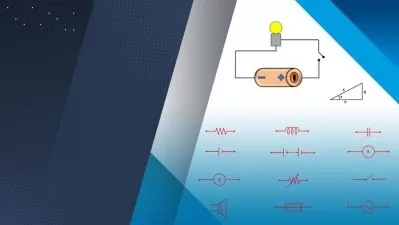Design and Analysis of Experiments (DoE)
Sandeep Kumar, Quality Gurus Inc.
4:40:21
Description
Design of Experiments using Minitab: Basics, Plackett-Burman, Full/Fractional Factorial, Response Surface (CCD) Designs
What You'll Learn?
- Fundamentals of the Design of Experiments (DoE) using simple to understand examples.
- Screening (Plackett-Burman), Modelling (Full, Fractional Factorial and Split Plot Designs) and Optimizing (Central Composite Design) Designs
- A quick refresher on ANOVA and Regression Analysis is also included to help you understand the results of analysis clearly.
- Clear understanding of Blocking, Analysis of Covariance, Replication, Confounding and Design Resolutions.
Who is this for?
More details
DescriptionThe design of experiments is a systematic approach of studying the relationship between various inputs (factors) on the key output (response).
This is the basics to the intermediate level course. In this course, we start with a basic understanding of the Design of Experiments (DoE) process by performing manual calculations on simpler processes.
Because this course will be taken by students from various sectors, we have kept the case studies simpler by using examples such as coffee tasting and catapult. These simple examples will help student focus on the concepts rather than focusing on the specific case studies.
This course assumes that you do not have any prior knowledge of the Design of Experiments, but you do have a basic understanding of statistics principles, such as ANOVA and Regression. However, we will review these two topics (ANOVA and Regression) to provide adequate knowledge to interpret the DoE results.
The course consists of video lectures, readings, and quizzes that help build upon each other so that by the end of the course, you have gained a firm grasp of the topics covered.
Topics Covered:
Section 1. Basics of Design of Experiments: We will start this course by understanding the definitions of common terms used in DoE. You will clearly understand factorial and partial factorial designs, as these will be explained by using an example of coffee tasting. In addition, we will also use the catapult experiment to understand the variation in processes.
Other concepts that are covered in this section include: Blocking, Analysis of Covariance, Replication, Confounding and Design Resolutions.
This section will set a strong foundation for you to understand foundational concepts.
Section 2. ANOVAÂ and Regression: Even though it is expected that you have some basic understanding of these concepts, we will still cover these two topics to provide you with sufficient knowledge to interpret the results of an experiment.
Section 3. Screening, Modelling and Optimizing: In this section, we will cover three main milestones in any designed experiment. For screening, we will use Plackett-Burman Design to reduce the number of factors to be studied. In modelling, we will use full factorial, fractional factorial and Split Plot Designs (for Hard to Change Factors). In the last, we will optimize the process, and for that, we will use Central Composite Design (CCD).
Who this course is for:
- Quality Engineers
- Quality Managers
- All Engineers
- Performance Improvement Professionals
- Any one who wants to understand the behaviour of a complex process to achieve desired outcome
The design of experiments is a systematic approach of studying the relationship between various inputs (factors) on the key output (response).
This is the basics to the intermediate level course. In this course, we start with a basic understanding of the Design of Experiments (DoE) process by performing manual calculations on simpler processes.
Because this course will be taken by students from various sectors, we have kept the case studies simpler by using examples such as coffee tasting and catapult. These simple examples will help student focus on the concepts rather than focusing on the specific case studies.
This course assumes that you do not have any prior knowledge of the Design of Experiments, but you do have a basic understanding of statistics principles, such as ANOVA and Regression. However, we will review these two topics (ANOVA and Regression) to provide adequate knowledge to interpret the DoE results.
The course consists of video lectures, readings, and quizzes that help build upon each other so that by the end of the course, you have gained a firm grasp of the topics covered.
Topics Covered:
Section 1. Basics of Design of Experiments: We will start this course by understanding the definitions of common terms used in DoE. You will clearly understand factorial and partial factorial designs, as these will be explained by using an example of coffee tasting. In addition, we will also use the catapult experiment to understand the variation in processes.
Other concepts that are covered in this section include: Blocking, Analysis of Covariance, Replication, Confounding and Design Resolutions.
This section will set a strong foundation for you to understand foundational concepts.
Section 2. ANOVAÂ and Regression: Even though it is expected that you have some basic understanding of these concepts, we will still cover these two topics to provide you with sufficient knowledge to interpret the results of an experiment.
Section 3. Screening, Modelling and Optimizing: In this section, we will cover three main milestones in any designed experiment. For screening, we will use Plackett-Burman Design to reduce the number of factors to be studied. In modelling, we will use full factorial, fractional factorial and Split Plot Designs (for Hard to Change Factors). In the last, we will optimize the process, and for that, we will use Central Composite Design (CCD).
Who this course is for:
- Quality Engineers
- Quality Managers
- All Engineers
- Performance Improvement Professionals
- Any one who wants to understand the behaviour of a complex process to achieve desired outcome
User Reviews
Rating
Sandeep Kumar, Quality Gurus Inc.
Instructor's Courses
Udemy
View courses Udemy- language english
- Training sessions 42
- duration 4:40:21
- Release Date 2022/12/18









